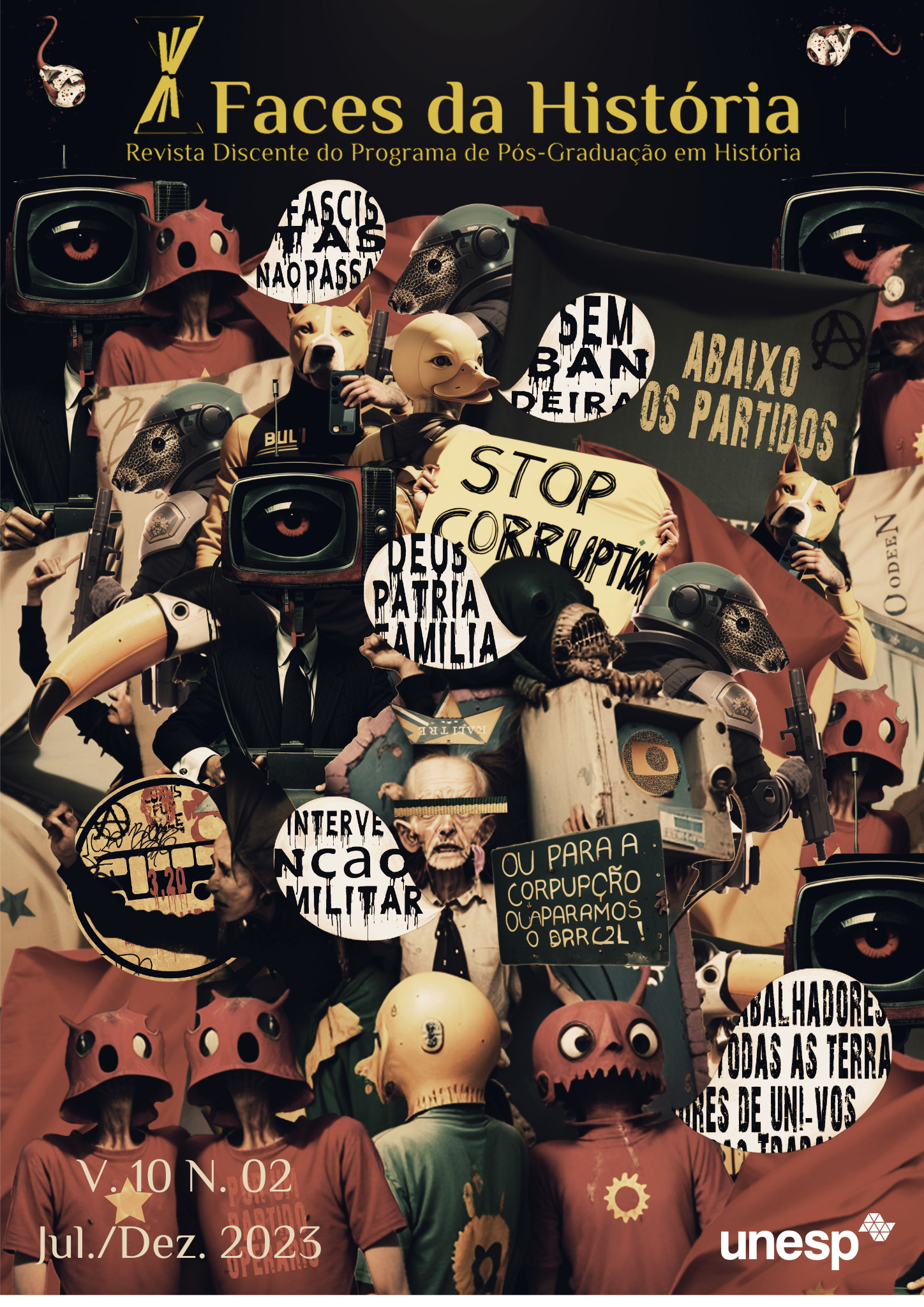Transformações e crises nos partidos políticos:
o caso do PSDB
Palavras-chave:
Partidos Políticos, Organizações Partidárias, PSDBResumo
O PSDB foi um dos partidos que mais sofreu com a continuidade dos governos do PT no período de 2003 a 2015, e, em 2018, com a eleição da extrema direita. Desde então o partido vem apresentando forte declínio organizacional e eleitoral. Diante das transformações e crises desse partido este trabalho tem dois objetivos. O primeiro é verificar em quais condições o PSDB chega para enfrentar sua crise atual, após um pouco mais de três décadas de existência. O segundo propósito, é discutir quais são as possíveis razões que estão relacionadas ao seu declínio político-eleitoral. Argumentamos que a consolidação de uma organização fraca levou ao longo do tempo o PSDB a uma fragilidade institucional e eleitoral. Para demonstrar esse argumento lançamos mão de estatísticas descritivas com dados organizacionais, dos recursos públicos dos partidos e dos votos e cadeiras angariados pelo PSDB ao longo de sua trajetória desde 1998. Nossa principal conclusão é a de que os anos na oposição aos governos petistas e as consecutivas derrotas no cenário eleitoral nacional criaram pressões exógenas e endógenas que culminaram em um enfraquecimento do partido, finalmente uma transição inconclusa da coalizão dominante foi o fator determinante para a crise atual do PSDB.
Referências
ASSUMPÇÃO, Raiane Patrícia Severino. Análise Organizacional da Social Democracia Brasileira no Estado de São Paulo (1988-2006): a estrutura relacional e o capital político. 2008. 382 f. Tese (Doutorado em Sociologia) Universidade Estadual Paulista “Júlio de Mesquita”, Araraquara, 2008.
BIEZEN, I. van and HOPKIN, J. Party organization in multi-level contexts. In: HOUGH, D.; JEFFERY, C. (eds.). Devolution and Electoral Politics. Manchester: Manchester University Press, 2006, p. 14-36.
COTTER, Cornelius Philip. et al. Organizations in American Politics. New York: Praeger, 1984.
DULCI, Marcelo Soares. PSDB: força e limites da resposta liberal aos desafios do Brasil contemporâneo. 2010. 305 f. Tese (Doutorado em Ciências Humanas) - Universidade Federal de Minas Gerais, Belo Horizonte, 2010.
DUVERGER, Maurice. Os partidos políticos. Rio de Janeiro: Zahar, 1970.
FRANZON, Davi José. A Eleição de João Dória Junior: A Ascensão do Partido de Modelo Empresarial? 2018. 104 f. Dissertação (Mestrado em Ciência Política) - Pontíficia Universidade Católica de São Paulo, São Paulo, 2018.
GENAIO, Pomeia. A Formação do Partido da Social Democracia Brasileira. 2003. 171 f. Dissertação (Mestrado em Ciência Política) - Universidade Federal do Rio de Janeiro, Rio de Janeiro, 2003.
GIDDENS, Anthony. A Terceira Via: reflexões sobre o impasse político atual e o futuro da social-democracia. Record: Rio de Janeiro, 1999.
GUIOT, André Pereira. Um “moderno Príncipe” para a burguesia brasileira: o PSDB (1988-2002). 2006. 154 f. Dissertação (Mestrado em História) - Universidade Federal Fluminense, Niteroi, 2006.
HAZAN, Reuven; PENNINGS, Paul Pennings. Candidate Selection in Western Democracies. Special issue of Party Politics, v. 7 n. 3, p. 267-275, 2001.
KING, Gary; KEOHANE, Robert; VERBA, Sidney. Designing social inquiry: scientific inference in qualitative research. Princeton. Princeton University Press, 1994, 259 p.
LAMOUNIER, Bolivar. Partidos e Utopias: o Brasil nos anos 90. São Paulo: Edições Loyola, 1996.
MAYER, Rodrigo Ricardo. Os partidos como Organizações: um estudo comparado do PSDB e PT. 2011. 86 f. Dissertação de Mestrado em Ciência Política – Universidade Federal do Paraná, Curitiba, 2011.
MICHELS, Robert. Sociologia dos Partidos Políticos. Brasília: UNB, 1982 [1911].
PANEBIANCO, Ângelo. Modelos de Partidos: Organização e poder nos partidos políticos. São Paulo: Martins Fontes, 2005.
RIBEIRO, Pedro Floriano. Organização e poder nos partidos brasileiros: uma análise dos estatutos. Revista Brasileira de Ciência Política, Brasília, nº10, p. 225-265, jan/abr. 2013.
ROMA, Celso. A Institucionalização do PSDB entre 1988 e 1999. Revista Brasileira de Ciências Sociais, v. 17 n. 49, p.71-92, 2002.
SANTOS, Fabiano, TANSCHEIT, Talita. Quando Velhos Atores Saem de Cena: A Ascensão da Nova Direita Política no Brasil. Colombia International, n. 99, p. 151-186, 2019.
SILVEIRA, Leonardo; GOMES, Aline B. Pereira. Gomes. Entre a Especificidade e a Teorização: A metodologia do Estudo de Caso. Revista Teoria & Sociedade, n. 22.2, p.75-101 – jul/dez 2014.
SPECK, Bruno Wilhelm; CAMPOS, Mauro Macedo. Questionando a tese da cartelização: o financiamento das organizações partidárias no Brasil (1998-2016). Revista Opinião Pública, nº 3. Campinas, p.923-959, set-dez, 2021.
TAVITS, Margit. Post-communist Democracies and Party Organization. New York: Cambridge University Press, 2013.
TSE. Tribunal Superior Eleitoral. Resultados e Estatísticas Eleitorais. Disponível em: https://sig.tse.jus.br. Acesso em: 10 mai-2023.
TSE. Tribunal Superior Eleitoral. Estatísticas de Eleitorado. Disponível em: https://www.tse.jus.br/eleicoes/estatisticas/estatisticas-de-eleitorado/filiados. Acesso em: 5 Jul-2023.
TSE. Tribunal Superior Eleitoral. Sistema de Gerenciamento de Informações Partidárias. Disponível em: https://www.tse.jus.br/partidos/partidos-registrados-no-tse/informacoes-partidarias/modulo-consulta-sgip3. Acesso em: 5 jul-2023.
VIEIRA, Soraia. O partido da Social Democracia Brasileira: trajetória e ideologia. Curitiba, 2016.
WILSON, James Q. The Amateur Democrat. Chicago: University of Chicago Press. 1962.
Publicado
Como Citar
Edição
Seção
Licença
Autores que publicam na Revista Faces da História concordam com a cessão dos direitos autorais dos manuscritos, processo simultaneamente licenciado sob a Licença Creative Commons Attribution (CC-BY-NC), que permite o compartilhamento do trabalho com reconhecimento da autoria e publicação inicial nesta revista. Dessa forma, a Revista Faces da História pode difundir os artigos e trabalhos publicados, em formatos físicos e/ou eletrônicos, incluindo Internet.




